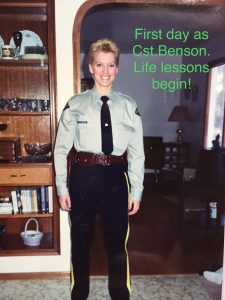Surviving sexual harassment.
How did I survive sexual harassment in the RCMP?
It was a series of stages as I began to find my voice. How to survive workplace sexual-harassment will look different for each victim because we are unique, have our own tools and strategies (or create them ) and circumstances.

The name-calling beaver and raison tits! As you can imagine I was shocked and embarrassed. Ignoring it didn’t seem to work, it continued.
I went to each one of them individually asked him politely to please stop calling me those names, they simply laughed
Next I went to our boss, our leader, and explained the name calling, how I felt, and asking him to tell them to please stop calling me these names. He simply laughed, and said maybe I enjoy the attention. That was very discouraging. The message was clear I was on my own. The message this is a bullying workplace.
At parties a couple of these same officers thought is was funny to bump and grind me in the doorways. Pretend to follow me into the bathroom, try to kiss me at Christmas parties. At another detachment the commander thought it would be funny to push me back in my chair up against the wall and kiss me, no one said anything. In fact their laughter encouraged him. I was frequently asked about what I like in bed, sexual comments on my civilian clothes, they offered ‘to service me’ sexually even though I showed no interest and they were married.
Psychology today and sexual-harassment in the workplace.
Why do many victims of sexual harassment not come forward?
According to the Equal Employment Opportunity Commission, many women who are sexually harassed do not come forward but instead try to avoid their harasser, downplay the seriousness of the crime, or simply try to ignore it or forget that it happened. Shame or self-blame, denial or disbelief, fear of consequences, low self-esteem, feelings of helplessness, and a sense that they will not find support or justice all contribute to an unwillingness to come forward.
How can people respond to sexual harassment?
Studies of workplace cultures find that when harassment victims feel isolated or unsupported, they are less likely to report abuse, and perpetrators are more likely to prey on others. Companies in which harassment is discussed openly and bluntly at every level, and with every manager; which support victims’ collective testimony; and do not mandate gag orders can successfully limit incidents. But it is also crucial, research suggests, that bystanders who witness or become aware of harassment speak up, support victims, and unite to challenge harassers without facing repercussions.

Speaking up took a long time. It’s scary getting out of the comfort zone of being a victim from sexual-harassment. We tend to blame ourselves and down play the seriousness. Our sense of safety in the workplace is shattered, feelings of dread going to work and working with individuals who truly believe they have the right to sexually harass and abuse other people.
Sexual harassment leaves its own trauma. There were times where I thought if I did not shower, brush my teeth they would stop. It was not a solution. Sexual harassment is about power. There was nothing sexy about my uniform, bulky uniform and bullet proof vest, no makeup, no perfume, nothing that remotely made me look sexual. It is about power.
I learned strategies to avoid certain places with these two officers, avoided parties where I was the only female, did not engage in their disgusting comments, left the room, did not go for coffee with them, refused to be alone in the car with either of them and preferred to drive alone or with other officers while on duty. It only takes one person to ruin a workplace if there is failed leadership.
I kept up with hanging out with supportive positive friends and my therapist. Later learned effective listening and communication skills to avoid getting caught up in their negative abusive conversations. It took practice to detach from the sexual harassment and workplace bullying. I eventually filed a Canadian Human Rights Complaint that was the only thing that seemed to get the detachment commanders attention and the attention of the RCMP. Clearly no one was listening and speaking in the way of a formal complaint was a start of beleiivng in the power of my voice. I knew that doing nothing then nothing was going to change, I had to try, you have to try to speak up to defend yourself. Even if nothing changed it was empowering to me. Everyone is different and has to feel safe on their own terms.
Language and the power of our words can make a different in dealing with sexual harassment. Using’ I’ messages and the power of the word, NO! For example: “I will not respond to you if you talk to me that way”, “That is disrespectful and I will not talk to you until you calm down and can converse with respect.” “When you yell/scream/use foul degrading language/ talk to me this way I feel humiliated please stop.” No matter what they did, speaking up was about taking back my own power using my voice to end the violence. Either way I felt empowered. Sometimes when we change how we respond the bully/harasser may also change, not always but you feel stronger. It worked for me and the journey began.
Surviving sexual harassment is a journey. A journey of self discovery of your own voice and in speaking up. A journey of discovering your own boundaries, creating a self care toolkit, seeking positive supportive people, professional help, documenting and filing formal complaints or criminal charges. No one and I repeat no one has the right to touch you, humiliate or abuse you at home and in the workplace. NO ONE! The power of bystanders can also end the violence and create a sense of safety for the victim. Eventually I did file formal complaint and only then did it stop. However many people have a hard time with accountability and consequences for their bad/abusive behaviour. The problem went from sexual harassment to bullying, that is another story. Was it worth speaking up about the sexual harassment? Absolutely yes. Was it worth filing a formal complaint about the sexual harassment? Absolutely yes. Doing nothing then it gets worse and often escalates. Speaking up is important for everyone.
Our scars remind us where we have been but do not have to define our future. We have a choice in how we react, respond and what we retain. Surviving sexual harassment is about relearning to trust yourself, your surroundings and with the people in your workplace, most importantly is trusting your voice to speak up. As I look back from today I am amazed that I put up wish such shit from those losers. Mostly it was out of a backward sense of RCMP loyalty in believing they were right and I was wrong to speak up. Clearly that was misguided loyalty. A healthy workplace values and treats all employees we respect. A good employee is like gold.
Never give up on you!
